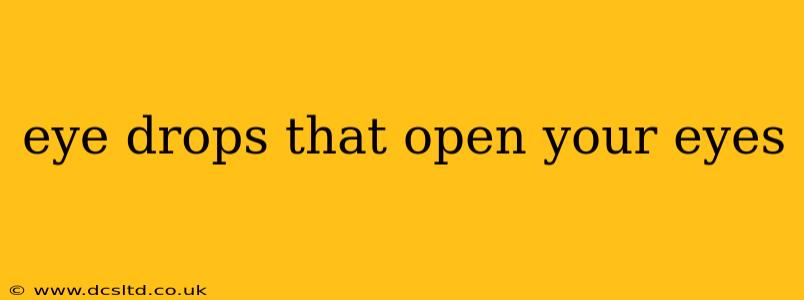Many people search for "eye drops that open your eyes," often experiencing issues like drooping eyelids (ptosis) or the uncomfortable sensation of heavy eyelids. It's important to understand that eye drops themselves cannot directly "open" your eyes if the issue stems from a medical condition. However, certain types of eye drops can alleviate symptoms associated with conditions that cause your eyes to feel heavy or appear less open. This article will explore the different causes and potential solutions.
What Causes Eyes to Feel Heavy or Appear Partially Closed?
Before discussing eye drops, let's address the root causes of eyes feeling heavy or appearing less open. These can range from minor irritations to more serious medical conditions:
- Dry Eye Syndrome: This common condition occurs when your eyes don't produce enough tears or produce poor-quality tears. The resulting dryness can lead to a gritty, burning sensation and make your eyes feel heavy and less open.
- Blepharitis: Inflammation of the eyelids, often caused by bacterial infection or skin conditions like eczema or rosacea, can cause the eyelids to become swollen, red, and crusted, making your eyes appear partially closed.
- Allergies: Allergic reactions to pollen, dust mites, pet dander, or other allergens can cause eye irritation, itching, swelling, and tearing, potentially leading to a feeling of heaviness.
- Ptosis (Drooping Eyelid): This condition, often caused by muscle weakness or nerve damage, can result in one or both eyelids drooping, partially obscuring vision.
- Eye Strain: Prolonged computer use, reading, or other near-work activities can lead to eye fatigue and a feeling of heaviness in the eyelids.
- Lack of Sleep: Insufficient sleep can contribute to puffy eyelids and a feeling of overall eye fatigue.
What Types of Eye Drops Might Help?
Depending on the underlying cause, different types of eye drops can offer relief:
-
Artificial Tears: These are over-the-counter lubricants that mimic natural tears, providing relief from dry eye symptoms. They can help alleviate the heaviness and discomfort associated with dry eyes. These are not a cure but a symptomatic treatment.
-
Antihistamine Eye Drops: For allergy-related eye symptoms, antihistamine eye drops can help reduce itching, swelling, and redness, potentially improving the feeling of heaviness around the eyes.
-
Antibiotic Eye Drops: If blepharitis is suspected (often diagnosed by an ophthalmologist or optometrist), your doctor might prescribe antibiotic eye drops to treat any underlying bacterial infection.
-
Other Eye Drops: In cases of more serious conditions like ptosis, specialized treatments, potentially including surgery, are necessary. These conditions should be addressed by an eye care professional.
Can Eye Drops Really "Open" My Eyes?
No, eye drops alone cannot magically open your eyes if you have a condition like ptosis. While eye drops can alleviate symptoms associated with conditions that make your eyes feel heavy or appear less open (like dry eye or allergies), they won't address the underlying muscle or nerve issues causing ptosis.
What Should I Do if My Eyes Feel Heavy or Droopy?
If you experience persistent heaviness, drooping, or other unusual changes in your eyelids, it's crucial to consult an ophthalmologist or optometrist. They can properly diagnose the cause of your symptoms and recommend appropriate treatment. Self-treating can delay proper medical care for potentially serious conditions.
How Often Should I Use Eye Drops?
Follow the instructions on the eye drop packaging carefully. Overuse can lead to irritation. If you are unsure about usage frequency, consult your doctor or pharmacist.
Are There Any Side Effects of Using Eye Drops?
Some people may experience temporary side effects such as burning, stinging, or redness. If these effects are severe or persistent, discontinue use and consult a healthcare professional.
This information is for general knowledge and does not constitute medical advice. Always consult with a qualified healthcare professional for any concerns about your eye health. They can properly diagnose any underlying issues and recommend the most effective treatment options.
